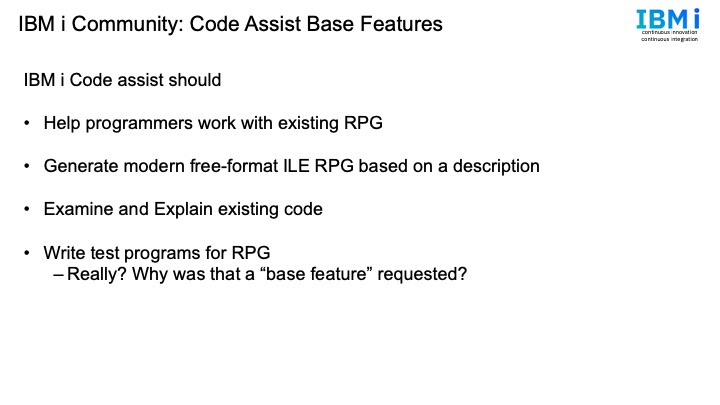Generative AI Capabilities Come to IBM i
IBM i CTO Steve Will asks for community support in RPG-based large language model model creation
The time is right for AI to come take center stage with IBM i users, according to IBM. At the recent COMMON POWERUp 2024, Steve Will, IBM i CTO and Distinguished Engineer at IBM, announced exciting new ways that the platform will take advantage of AI.
While IBM has highlighted customer success stories of AI and IBM i uses since 2017, useful solutions are coming to the whole IBM i community, and Will wants the community to help.
Will explained to attendees at the Fort Worth conference the three AI use cases IBM i users can implement on the platform (see Figure 1):

- Supporting open-source technology that connects business transactions to AI for analysis
- Automating operations to improve your Power systems performance
- Enhancing the developer experience with code assistant for RPG
Will’s opening session remarks follow IBM’s announcement a few weeks prior to introducing the IBM Power S1012, which allows for AI interfacing workloads to run outside mainstream data center facilities and in direct connection to cloud services.
“When we make an investment, we can be pretty sure it will be useful for a significant period of time. In the earlier days that was not quite so much. Things were changing a lot and they’re still changing, but we have a better idea now of what’s going to last,” Will says.
He notes how AI has “become available in so many different ways that people can try it out and get a feel for what AI might be able to help them do” around code assistance.
Creating an RPG Code Assistant With Generative AI
The first two use cases are closely tied, and Will hints that users will see more specific announcements in the coming months and years as to how they will be applied.
For the third use case, IBM is currently soliciting clients to help create a large language model (LLM) that will be the basis for a well-trained RPG code assistant. The goal, Will says, is twofold:
- Help non-RPG programmers learn the language and incorporate it very early in their career
- Give support to current developers to analyze and understand the code so they can modernize it
The biggest challenge around hiring new programmers often boils down to skills. It can be difficult for them to take this massive amount of RPG that exists in the world today and add something to it and maintain it.
“If we can take the power of generative AI and large language models, and help programmers with existing RPG, we can help solve this problem,” the IBM i CTO explains. “If you could hire someone who knows another programming language, they don’t know RPG, and this tool can help them with that, that would be very beneficial to the broader community.” (See Figure 2).

Another use includes a sort of reverse lookup. Will envisions prompting an LLM with a piece of old code and having the results explain what the code is doing.
This type of workflow would help new programmers better understand the code: “We tend to find new programmers going into old code. It doesn’t matter how well somebody thinks they documented it, if it was written in RPG II, it looks really hard to understand to a brand new programmer,” he notes.
Additionally, the model can support understanding pre-ILE RPG code and transforming it into ILE RPG code, allowing programmers to work from the same, modern language.
A Call for RPG Code: How You Can Help
To support this effort, Will put out a call at COMMON for volunteers willing to submit code to IBM that can be used to train a model for RPG.
Understanding the request is for potential proprietary information, Will ensures that in IBM’s corporate strategy, input in its models are vetted and cleared: “It’s not going to just be anything, anywhere, all the time. We have processes in place that are going to help make sure that this gets trained properly.”
Eager to submit code to train the model and support RPG programmers? Right now, IBM is seeking community members willing to share code in the open-source community and, potentially, for training purposes but kept private. Once a licensing model is in place, participants can then submit code. In the meantime, those interested in participating can send a message to AIforIBMi@ibm.com.
“Over the course of the next several months, couple years, we will have a tool that was specifically trained to help this community solve one of the biggest problems that we face, which is a continuing support and enhancement of existing code that we have,” Will says. “We’ll start with RPG, and we’ll see where it goes from there.”
Individuals and companies have already shown interest in contributing to the project. So far Jon Paris, Susan Gantner, Scott Klement, Jim Buck, Paul Tuohy, Niels Liisberg, Yvonne Enselman, Mats Lidström, Koen DeCorte and Steve Bradshaw are among the IBM experts, clients and IBM Champions to agree to participate. Will appreciates the eagerness from users, and feels it himself.
“This is the biggest new learning I have come across in my career. I cannot believe how much like a student I feel because there’s so much to learn,” Will says. “It’s extremely exciting at this point in my career to be able to embrace such a large and growing technology.”